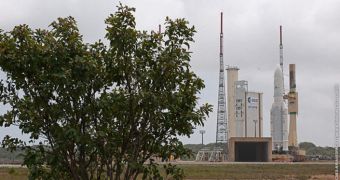Experts with Arianespace, a French group that became the first commercial space transportation company, announce that a heavy-lift delivery system scheduled to launch two new satellites in Earth's orbit yesterday, March 30, failed to launch after system checks discovered a glitch.
The rocket, a massive Ariane 5, was supposed to take off from a launch facility at the Kourou Space Center, in French Guiana, South America. This is where the European Space Agency (ESA) conducts rocket launches from.
The Ariane 5 – which has one of the most impressive track records in the world – was supposed to carry two communications satellites to injection orbits. However, its rocket engines burned for only 7 seconds after launch.
After the motors ignited, a systems check performed automatically uncovered an error that made the rocket shutdown its engines automatically. The rocket was supposed to take off at 5:45 pm EDT (2145 GMT), Space reports.
Luckily, Arianespace experts explain in a statement, the engines were shut down before the two solid rocket boosters (SRB) that help propel cargo to orbit were instructed to ignite. Once this happens, there is no way for the launch sequence to be aborted.
A checkout process “was not completed successfully, preventing the boosters' ignition and thereby aborting the mission. The Ariane 5 and its two payloads remain in a safe mode on the launch pad,” the statement explains.
As main engines are ignited, this class of rockets performs a series of so-called checkout tests. If the 50-meter (165-foot) vehicle passes, then the rocket boosters are ignited and the delivery system allowed to launch.
Officials with the company explain that the rocket will most likely be taken off the launch pad, and carried back in an assembly building. Experts will then analyze what went wrong, and try to fix the glitch so that incidents such as this one do not happen in the future.
“We do not take any risks, and therefore it is very important we determine the causes,” explains the chairman and CEO of Arianespace, Jean-Yves Le Gall.
The official adds that a new launch date will be set for the vehicle and its two satellites only after the malfunction investigation is completed, and engineers declare themselves satisfied with what they've learned from this incident.
At this point, the Ariane 5 is among the most reliable delivery systems in the world. Two partial failures are the only dark spots on its record, but it managed to complete some 54 flights successfully in exchange. Arianespace is using instances such as this one to improve its record even further.

 14 DAY TRIAL //
14 DAY TRIAL //